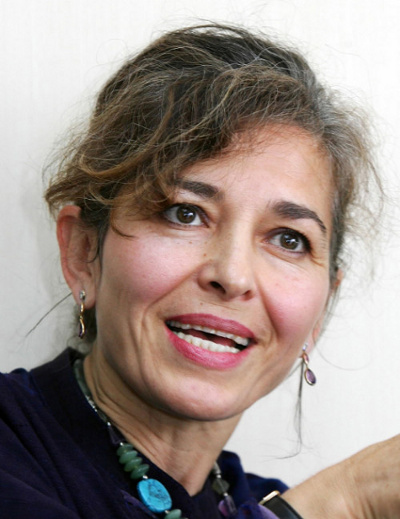Nassrine Azimi, departing director of UNITAR Hiroshima office, recalls success of trainee program
Jul. 1, 2009
by Miho Kuwajima, Staff Writer
On June 26, Nassrine Azimi, the first director of the Hiroshima office of the United Nations Institute for Training and Research (UNITAR), who will step down at the end of this month, visited the Hiroshima Prefectural Government and called on Hiroshima Governor Yuzan Fujita in connection with her decision to step down. The Chugoku Shimbun spoke with Ms. Azimi about the six years, from July 2003, she served in this post.
What are your thoughts as you look back on the past six years?
On the morning of the day I assumed the post, I hoisted the U.N. flag on the roof of the building of the Hiroshima Chamber of Commerce and Industry in downtown Hiroshima, in which the Hiroshima office was opened. A security guard was with me on the roof. When he looked out over Peace Memorial Park, in front of the building, and told me his “mother and grandmother are resting there,” I realized that this place is very important for human beings.
The Hiroshima office has pursued its mission by putting priority on inviting as many trainees as possible from around the world. I am confident that the Hiroshima office has been of great benefit to these participants, such as the young government officials from Afghanistan who have been invited to take part in workshops held each year in Hiroshima. I would like to express my gratitude for all the local support, including the support of Hiroshima Prefecture.
What do you see as future challenges for the Hiroshima office?
It is essential to maintain a UNITAR office in Hiroshima. I hope the Hiroshima office will expand its range of activities by enhancing training programs on nuclear disarmament, nuclear non-proliferation, global warming, and food issues. I also hope the office will forge closer ties with local universities and citizens’ groups as well as make continuous efforts to increase public recognition of its work.
What do you think about Hiroshima’s current efforts?
In Iran, where I was born, grave human rights violations are now occurring and this troubles me on a daily basis. Hiroshima, which has been appealing for lasting peace, should do more to promote the significance of enduring peace to the world.
I think that “peace,” as currently advocated by Hiroshima, is perhaps confined to Hiroshima Peace Memorial Park. What about making better use of local human resources and introducing the concept of “peace” to the overall town development of Hiroshima Prefecture? I believe local governments, cultural facilities, educational institutions, and medical institutions could do many things if they establish ties with one another.
(Originally published on June 27, 2009)
Related articles
UNITAR trainees reassess value of A-bomb Dome and Peace Memorial Park (May 23, 2009)
UNITAR symposium discusses future of A-bomb Dome (April 27, 2009)
Hiroshima and the World: Meditations from Hiroshima Peace Memorial Park (March 23, 2009)
On June 26, Nassrine Azimi, the first director of the Hiroshima office of the United Nations Institute for Training and Research (UNITAR), who will step down at the end of this month, visited the Hiroshima Prefectural Government and called on Hiroshima Governor Yuzan Fujita in connection with her decision to step down. The Chugoku Shimbun spoke with Ms. Azimi about the six years, from July 2003, she served in this post.
What are your thoughts as you look back on the past six years?
On the morning of the day I assumed the post, I hoisted the U.N. flag on the roof of the building of the Hiroshima Chamber of Commerce and Industry in downtown Hiroshima, in which the Hiroshima office was opened. A security guard was with me on the roof. When he looked out over Peace Memorial Park, in front of the building, and told me his “mother and grandmother are resting there,” I realized that this place is very important for human beings.
The Hiroshima office has pursued its mission by putting priority on inviting as many trainees as possible from around the world. I am confident that the Hiroshima office has been of great benefit to these participants, such as the young government officials from Afghanistan who have been invited to take part in workshops held each year in Hiroshima. I would like to express my gratitude for all the local support, including the support of Hiroshima Prefecture.
What do you see as future challenges for the Hiroshima office?
It is essential to maintain a UNITAR office in Hiroshima. I hope the Hiroshima office will expand its range of activities by enhancing training programs on nuclear disarmament, nuclear non-proliferation, global warming, and food issues. I also hope the office will forge closer ties with local universities and citizens’ groups as well as make continuous efforts to increase public recognition of its work.
What do you think about Hiroshima’s current efforts?
In Iran, where I was born, grave human rights violations are now occurring and this troubles me on a daily basis. Hiroshima, which has been appealing for lasting peace, should do more to promote the significance of enduring peace to the world.
I think that “peace,” as currently advocated by Hiroshima, is perhaps confined to Hiroshima Peace Memorial Park. What about making better use of local human resources and introducing the concept of “peace” to the overall town development of Hiroshima Prefecture? I believe local governments, cultural facilities, educational institutions, and medical institutions could do many things if they establish ties with one another.
(Originally published on June 27, 2009)
Related articles
UNITAR trainees reassess value of A-bomb Dome and Peace Memorial Park (May 23, 2009)
UNITAR symposium discusses future of A-bomb Dome (April 27, 2009)
Hiroshima and the World: Meditations from Hiroshima Peace Memorial Park (March 23, 2009)







